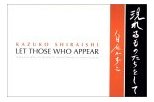|
Contents » Cover |
||
|
Reviews
Kazuko Shiraishi was described by Donald Keene as "the outstanding poetic voice of her generation of disengagement in Japan." Born in Canada in 1931, she moved with her family to Japan in 1938. The contrast between laidback Vancouver and the fervent nationalism of Japan at that time was a formative influence on the young Shiraishi, and left her feeling an outsider in her own country. In the late 50s, she moved to Tokyo, almost single-handedly creating the Japanese "Beat Generation." She performed with many American jazz musicians, and translated Allen Ginsberg into Japanese. Indeed she worked so closely with Ginsberg that Kenneth Rexroth—another friend of Shiraishi's—was prompted to describe her as "the Allen Ginsberg of Japan." In fifty years, Shiraishi has written twenty volumes of poetry and prose, her most famous book being Seasons of Sacred Lust, published in English by New Directions in 1970. This same imprint has now published the collection Let Those Who Appear, which brings together a selection of poems first published in Japanese between 1988 and 2000. Shiraishi confounded all my expectations. She's nothing like the classical Japanese poetry of Buson or Issa, or the modern Zen poetry of Shinkichi Takahashi. Far from minimalist, her poems are expansive and improvisatory, akin more to Gary Snyder than any of her compatriots. Nonetheless they have a strong Buddhist sensibility, emphasising the unity and sanctity of all forms of life:
Breathing a ripple in that shiny single grain that single moment Her subject matter is wide-ranging: a concern for the oppressed and the environment, the contrast between the natural world and the ugliness and destructiveness of modern civilisation:
Birds don't sing anymore I was looking forward to reviewing this book, but finished reading it somewhat deflated. There is little rhythmic variation between the poems, and the "improvisatory" element sometimes seems forced and naive. Shiraiki is reputedly a spellbinding performer when reading her poems—perhaps the printed page is not her best medium.
|
|||||
